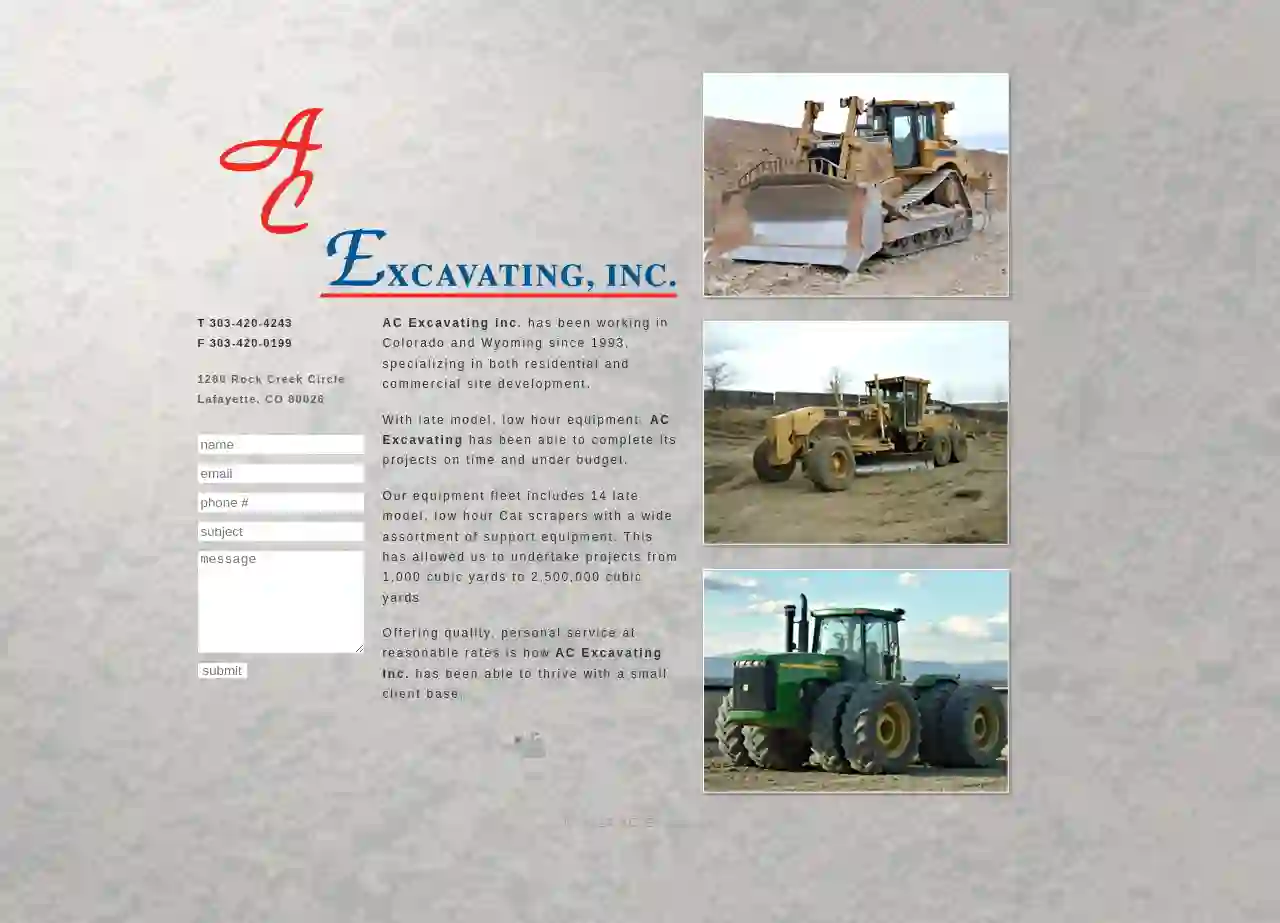Dirt Contractors Lafayette
Find the best Dirt Contractors in Lafayette
Get 3 FREE Dirt Contractor quotes for your project today! Compare profiles, reviews, accreditations, portfolio, etc... and choose the best offer.

AC Excavating, Inc.'s
44 reviews1280 Rock Creek Circle, Lafayette, 80026, USAC Excavating Inc. has been a trusted name in Colorado and Wyoming since 1993, specializing in both residential and commercial site development. We're committed to delivering high-quality work on time and within budget, thanks to our modern, low-hour equipment fleet. Our team is dedicated to providing personalized service at competitive rates, ensuring your project is completed to your satisfaction. Our fleet includes 14 late model, low hour Cat scrapers, along with a wide range of support equipment. This allows us to handle projects of all sizes, from small-scale residential developments to large-scale commercial projects. We've successfully completed projects ranging from 1,000 cubic yards to 2,500,000 cubic yards.
- Services
- Why Us?
- Gallery
Get Quote
Over 3,943+ Excavation Contractors in our network
Our excavation experts operate in Lafayette & beyond!
ExcavationHQ has curated and vetted the Best Excavation Contractors arround Lafayette. Find a top & reliable pro today.
Frequently Asked Questions About Dirt Contractors
- Efficiently Spread and Level Dirt: Using specialized equipment like bobcats or skid steers to ensure even distribution and proper compaction.
- Achieve Precise Grading: Following specific grades and contours for drainage or construction purposes.
- Handle Large Volumes of Dirt: Managing large deliveries and removals with dump trucks and other heavy machinery.
- Minimize Risks and Ensure Safety: Working safely and efficiently, reducing the potential for injuries or property damage.
- **Good Drainage:** Allows excess water to drain away, preventing waterlogging and root rot.
- **Adequate Aeration:** Provides sufficient air pockets for root respiration.
- **Nutrient Retention:** Holds onto essential nutrients for plant uptake.
- **Easy to Work With:** Not too heavy or too light, making it manageable for digging and planting.
- Mark Utilities: Before excavation begins, contact utility companies to have underground utilities marked to prevent accidental damage.
- Secure the Perimeter: Fence off the work area to restrict access and prevent accidental falls or injuries.
- Protect Existing Landscaping: Cover or move any valuable plants, shrubs, or trees that might be affected by the dirt removal process.
- Dust Control: Ask the contractor about dust suppression measures they'll implement to minimize dust generation and protect air quality.
- Communicate with the Contractor: Discuss any specific concerns you have regarding property protection before the work commences.
- Designated Disposal Facilities: Contact your local waste management authority or search online for designated dirt and debris disposal facilities in your area. They accept various types of soil and construction materials.
- Recycling Centers: Some recycling centers accept clean fill dirt, concrete, or brick for reuse in other construction projects.
- Donation: If the dirt is clean and suitable for gardening or landscaping, consider donating it to community gardens, schools, or neighbors with landscaping projects.
Can I spread dirt myself, or should I hire a professional?
What is the best type of dirt for my garden?
How do I protect my property during dirt removal?
What is the best way to dispose of excess dirt?
Can I spread dirt myself, or should I hire a professional?
- Efficiently Spread and Level Dirt: Using specialized equipment like bobcats or skid steers to ensure even distribution and proper compaction.
- Achieve Precise Grading: Following specific grades and contours for drainage or construction purposes.
- Handle Large Volumes of Dirt: Managing large deliveries and removals with dump trucks and other heavy machinery.
- Minimize Risks and Ensure Safety: Working safely and efficiently, reducing the potential for injuries or property damage.
What is the best type of dirt for my garden?
- **Good Drainage:** Allows excess water to drain away, preventing waterlogging and root rot.
- **Adequate Aeration:** Provides sufficient air pockets for root respiration.
- **Nutrient Retention:** Holds onto essential nutrients for plant uptake.
- **Easy to Work With:** Not too heavy or too light, making it manageable for digging and planting.
How do I protect my property during dirt removal?
- Mark Utilities: Before excavation begins, contact utility companies to have underground utilities marked to prevent accidental damage.
- Secure the Perimeter: Fence off the work area to restrict access and prevent accidental falls or injuries.
- Protect Existing Landscaping: Cover or move any valuable plants, shrubs, or trees that might be affected by the dirt removal process.
- Dust Control: Ask the contractor about dust suppression measures they'll implement to minimize dust generation and protect air quality.
- Communicate with the Contractor: Discuss any specific concerns you have regarding property protection before the work commences.
What is the best way to dispose of excess dirt?
- Designated Disposal Facilities: Contact your local waste management authority or search online for designated dirt and debris disposal facilities in your area. They accept various types of soil and construction materials.
- Recycling Centers: Some recycling centers accept clean fill dirt, concrete, or brick for reuse in other construction projects.
- Donation: If the dirt is clean and suitable for gardening or landscaping, consider donating it to community gardens, schools, or neighbors with landscaping projects.